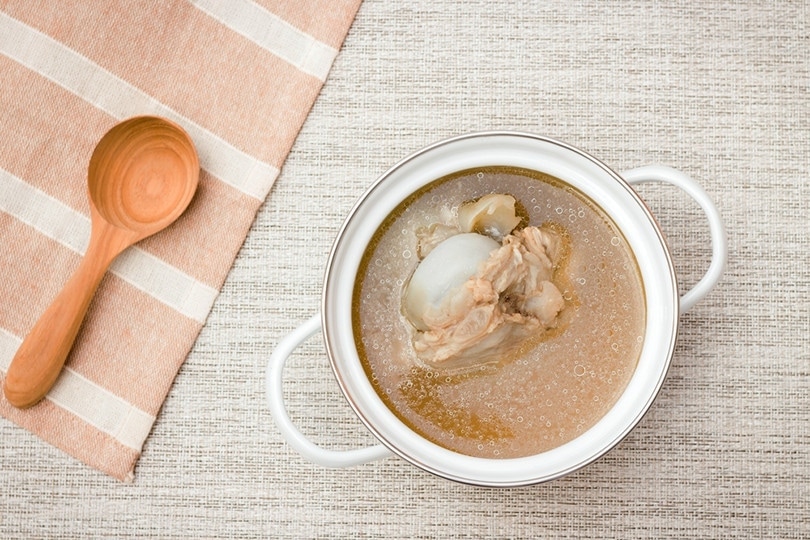9 Vet-Reviewed Benefits of Bone Broth for Dogs (With Recipes)

Updated on

As a dog owner, you’re likely always trying to find ways to optimize the health and happiness of your pup, no matter their breed or size. Sticking to a high-quality dog food free of fillers and artificial ingredients, making time for daily exercise and fun activities, and offering love are all important things you can do as a dog parent to enhance your pooch’s quality of life. But there is something else that you can do to support the happy and healthy experience you strive to provide your dog with: Feed them bone broth!
In fact, bone broth is a healthy food that both you and your pooch can enjoy together. There are many good reasons to incorporate bone broth into your dog’s diet regularly. We’ve put together this guide to provide you with all the information about why you should be feeding your dog bone broth and how to safely do so.
What Exactly Is Bone Broth?
In short, bone broth is simply water that bones from chickens, cows, and pigs have been simmered in for an extended period. You could use bones from just one animal or a mixture of animals, depending on your preferences. After the bones have been simmered, they are strained from the water, and the water becomes your bone broth. Sometimes vegetables are added to the mix for a little variety, but this isn’t a requirement. Bone broth isn’t complicated, and it can be as affordable or as expensive as you want it to be.
The 9 Benefits of Bone Broth For Dogs
1. Improved Hydration
If your dog needs to take in extra liquids or you struggle to get them to drink enough water, bone broth may be beneficial. Bone broth has a high water content because of how it’s made. It’s also much tastier than just plain water, which may help encourage your dog to drink and hydrate more.
Dogs recovering from illness or digestive issues may benefit from drinking bone broth to rehydrate them if they’ve lost fluids from vomiting or diarrhea.
2. Extra Nutrition
Bones and connective tissues are packed with nutrients, including protein, fat, and other micronutrients such as iron, calcium, potassium, and other minerals. Properly prepared bone broth is highly nutritious. Because of this, bone broth can benefit dogs that need to gain weight or a nutritional boost as they recover from illness.
Often, dogs can struggle to regain their appetite after being sick. Offering bone broth is an easy way to get nutrition into your dog without them needing to eat a big meal.

3. Joint Health
Bone broth contains gelatin hydrolysate, which has been proven to help dogs that have joint ailments, such as osteoarthritis. This is because gelatin hydrolysate has the same molecular structure as collagen cartilage found in their joints. Studies found significant improvement 1 in dogs that were given 2.5% gelatin hydrolysate (calculated on a dry matter basis). Therefore, it can be concluded that bone broth can help improve your pup’s joint health.
4. Gut Health
Research on human and animal models suggests that amino acids in bone broth may help improve your dog’s gut health. Specifically, bone broth may benefit dogs with digestive issues that irritate the lining of the intestines. The anti-inflammatory properties of the ingredients in bone broth may help soothe irritation and heal the damaged intestinal lining.
Other amino acids may also help decrease overall gut inflammation due to several health conditions.
5. Fight Inflammation
Several of the amino acids in bone broth may be beneficial in fighting inflammation in dogs. Many chronic conditions including arthritis, skin disease, and allergies, can cause inflammation in your dog.

6. High in Protein
While actual nutritional content varies from batch to batch, bone broth is typically high in protein. Like humans, dogs utilize protein 2 to build muscle and strengthen bones. It’s also a vital nutrient in cell repair and hair growth and helps form hormones and enzymes.
Dogs that are growing, very active, or recovering from being sick often need higher levels of protein to keep up with the demands of their bodies. Adding bone broth to the regular diet can provide a quick protein boost for these dogs.
7. Skin and Coat Health
As mentioned, protein is essential for maintaining strong, healthy hair growth. In addition, the collagen found in bone broth may benefit your dog’s skin, coat health, and joints. Collagen is one of the proteins naturally produced by the dog’s body, but older dogs may make less of it.
Offering your dog bone broth can supplement this natural collagen production, improving your dog’s skin and coat.
8. Helping Picky Eaters
Some dogs may naturally be picky and only stick to a limited flavor profile. In such cases, bone broths of their preferred flavors might be beneficial, as adding the broth onto other foods may make it easier to feed such picky individuals. The familiarity with the flavors of the broth may make new food items more readily accepted by such dogs.

9. Additional Nutrients
Bone broth is high in nutrients too. While it’s tough to determine just how much of a nutrient will end up in your own homemade bone broth due to variations of the ingredients that you might use, you can expect to find the following nutrients in your finished broth.
- Calcium
- Magnesium
- Zinc
- Vitamin A
- Vitamin K
- Iron
- Zinc
- Fatty acids
These are just a few of the vitamins and minerals your dog will ingest when enjoying a bowl of bone broth. Of course, bone broth shouldn’t replace your dog’s regular food during mealtime unless they’re sick and won’t eat. But it will supplement the nutrients that your dog is getting from their food.
How to Make Bone Broth at Home
You can always buy bone broth from the store, but commercial broths tend to include extra ingredients that aren’t necessary, like sugar. Luckily, it’s easy to make bone broth at home. All you must do is put animal bones of your choice into a stockpot, then fill the container with just enough water to cover the bones.

You should add a tablespoon or two of apple cider vinegar to the mix, as it will help pull the nutrients out of the bones so they end up in the actual broth that you’ll be feeding your dog. Bring your water to a boil, then reduce the heat and let the broth simmer for about 12 to 24 hours.
The longer you simmer the broth, the richer in flavor and nutrients it will be. You can use a slow cooker instead of a stockpot for fire-free cooking. Or, try using a pressure cooker or Instant Pot to significantly cut the simmering time down. After you’re done simmering the broth, strain it to remove the bones. A good bone broth is one that, after cooking and cooling, thickens and “gels”. Like a soft, semy-liquid Jello.
Bone Broth Variation Ideas
Bone broth shouldn’t have chunky ingredients in it when all is said and done. It should simply be broth, as its name suggests. But you can add ingredients to the stock as it simmers before straining the broth for extra flavor and nutrition. You can also serve the broth in various ways to enhance enjoyment.
- Embrace the Flavors of Fall. Consider putting half a Ceylon cinnamon stick in the bone broth while it simmers for a fun fall dog snack. The cinnamon is an anti-inflammatory and can help regulate your dog’s blood sugar levels.
- Add Root Veggies. Carrots will add flavor and extra health benefits to your dog’s bone broth. Just throw a couple of halved carrots in the pot while the bones simmer. Other root vegetables to consider adding to the mix include beets and parsnips.
- Soak Dog Food in It. If your dog is older and has a hard time chewing dry food, you can soak their food in the broth to enhance the food’s nutritional profile and make eating a little easier.
You can also use bone broth instead of water to bake homemade dog treats, or ice the broth and serve it instead of water to cool and refuel your pup on a hot summer day. The options are limited only to your imagination!
Our Final Thoughts
Bone broth is a delicious, healthy addition to any dog’s diet. The good news is that humans can also enjoy all the work you put into making bone broth at home. It may take a while to simmer, but bone broth is easy to make overall. It holds up well in the fridge, and you can even freeze it for long-term use if you make a big batch of it.
When you’re short on time, you can always buy some. Have you ever made bone broth? Have you thought about feeding bone broth to your dog?
Featured image credit: LisaRedfern, Pixabay













